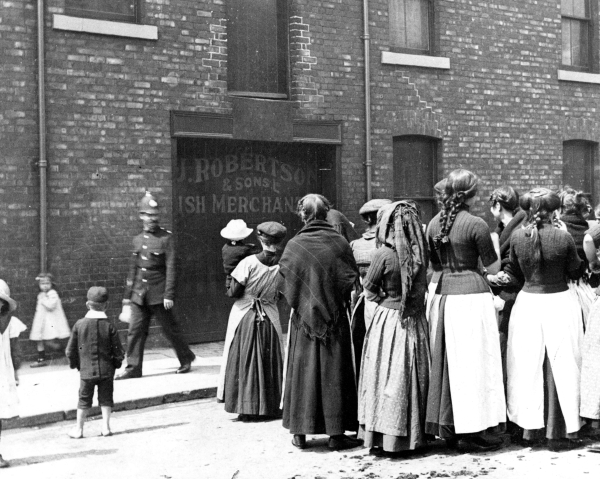My relatives fish curing business in Mile End Road, South Shields, reeked in the summer months of fish guts and wood smoke, for this was the peak of the herring season and Robertson’s were curing. In the small fish factories of the North and South Shields work would continue till midnight and throughout the weekends as women with razor-sharp knives tore the guts from the herring at a speed of hand that would have been the envy of many a magician. With toughened fingers and stinging eyes the ‘fish girls’ worked an average of sixty-four hours a week, for a basic wage of threepence an hour and no extra for evening and weekend work.
In June 1914, the women fish workers of North Shields decided they had gutted fish for long enough at such measly wages, walked out and took the ferry to South Shields. There, one hundred and fifty of them marched from the landing stage to Mile End Road, calling on the workers of Robertson’s, Brough’s and Fuller’s to join them.

The women were not members of a trade union but found energetic support from James Wilson of the National Amalgamated Union of Labour who helped them organise daily meetings at the union offices and at the Spence Assembly Rooms, North Shields. The demands were simple; women asked for sixpence an hour and overtime pay for evenings and weekends. The employers refused to discuss the matter, a spokesman from Robertson’s calling the demand ‘outrageous’ and claiming the women averaged twenty-one shillings a week in season and that women worked in the potato fields for one shilling and sixpence a day. Wilson was quick to point out that to earn twenty-one shillings a woman had to work eighty-four hours and that the last wage rise had been in 1887!
The public sympathised with the fish workers and financial support came in donations from the United Women Workers Association and the Harton Lodge of the Durham Miners’ Association, both contributing five guineas. The National Union of Railwaymen blacked the handling of fish at the ports and the secretary of the cartmen’s union responded to a complaint that his men were moving fish by declaring ‘the pen would go through their names in the Society’s books’.

Jane Lizzie Townsend emerged as the leader of the women at Robertson’s (tallest woman, back to the camera) and she borrowed a barrel organ which she and her mates dragged around Shields playing to raise money for the strike fund.
The strike continued until 4 August 1914, when war was declared and the herring trawlers were commandeered for naval use and fishing ended for the duration.
Sources:
Jim Robertson based on family members memories.
Photos:
South Tyneside Libraries
